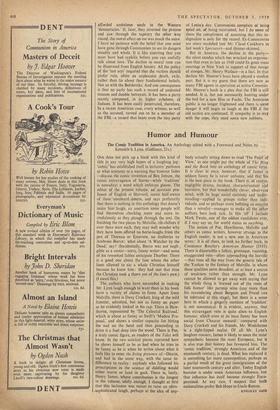Humor and Humour
The Comic Tradition in America. An Anthology edited with a Foreword and Notes by Kenneth S. Lynn. (Gollancz, 21s.) ONE does not pick up a 'book with this kind of title in any very high hopes of a laughing jag: 'comic' has established itself in lecturers' parlance as what amounts to a warning that humour fades —discuss the comic invention of Ben Jonson,.the comic extravagance of Sterne—while 'tradition' is nowadays a word which enforces gloom. The editor Of the present volume, an assistant pro- fessor of English at Harvard, seems half-aware of these' unkiward,4)mens, and says prefatorily that there is nothing in this anthology that doesn't make him• laugh, an assertion some people will find themselves checking more and more in- credulously as they plough through the text. On finishing the two pieces by Melville, rib-chillers if ever there were such, they may well wonder why they have been offered no horse-laughs from the pen of Thoreau or Emerson, no drolleries by Ambrose Bierce : what about 'A Watcher by the Dead,' say? (Incidentally, Bierce was not negli-, gible as a comic—sorry, funny writer—and some of his reworked fables anticipate Thurber. There is a good one about the lion whom the other lions allowed to eat a whole Christian himself because he knew him : they had met that time the Christian took a thorn out of the lion's paw.) (I mean this.) The authors who have, succeeded in making Mr. Lynn laugh enough to want them in his book have a variety of claims to fame. Apart from Melville, there is Davy Crockett, king of the wild frontier, admitted, but not as funny on paper as he evidently looked in his cap. There is Haw- thorne, represented by 'The Celestial Railroad,' which is about as funny as Swift's 'Modest Pro- posal,' and shows a similar capacity for hitting the nail on the head and then proceeding to drive it a foot deep into the wood. There is Poe, a truly comic figure, as readers of the Tales will know. In the two satirical pieces reprinted here he shows himself to be as bad when he tries to be funny as he is when he writes about what it feels like to enter the living presence of—DEATH, and bad in the same way, with the same in- difference to reality : anybody who followed his prescriptions in the science of diddling would either starve or land in gaol. There is, lastly, Henry James, whose contribution is the longest in the volume, oddly enough. I thought at first that this inclusion was meant to raise an ultra- sophisticated laugh, perhaps at the idea of any- body actually sitting down to read 'The Point of View,' as one might put the whole of The Ring and the Book into an anthology of comic verse. It is clear at once, however, that if James is seldom funny he 'is never unfunny, and that his is the best piece in the book. There is, of course, negligible drania, incident, characterisation rind 'narrative, but that wonderfully clever, observant mind, with its huge social curiosity and tmder- standing—applied to groups rather than indi- viduals, and so perhaps more befitting an essayist than a novelist—manages to make all the other authors here look sick. In this. 'all' I include Mark Twain, one of the oddest candidates ever, if I may say so, for world status as anything.
The notion of Poe, Hawthorne, Melville and others as comic writers, however strange to the English reader, is not a new, one in American terms: it is all there, to look no farther back, in Constance Rourke's American Humor (1931). There is discernible a folksy, grotesque, vaunting, exaggerated vein—often approaching the horrific —that runs all the way from the generic tale of the Yankee to the fantasy of Melville, in whom these qualities seem decadent, or at least a source of weakness rather than strength. Mr. Lynn cannot be allowed to get away with saying that the whole thing is 'brewed out of the roots of folk humor' like parsnip wine (any more than his maundering about Bergson and Freud can be tolerated at this stage), but there is a sense here in which a gingerly mention of 'tradition' is not nonsensical. It is evident, anyway, that this extravagant vein is quite alien to English humour, which even at its least funny has been social from Chaucer onward : compared with Davy Crockett and his friends, Mr. Wodehouse is a tight-lipped realist. Of all Mr. Lynn's laughter-rousers, James is likely to seem the most sympathetic because the most European, but it is also true that history has favoured him. The 'comic tradition,' strongly American and of the nineteenth century, is dead. What has replaced it is something far more cosmopolitan, perhaps as a partial result of the great immigrations of the later nineteenth century and after. Today English humour is under some American influence, but that influence has itself become strongly Euro- peanised. At any rate, I suspect that both nationalities prefer Bob Hope to Uncle Remus.
KINGSLEY AMTS


















































 Previous page
Previous page